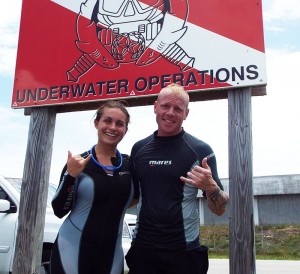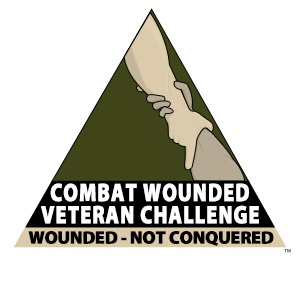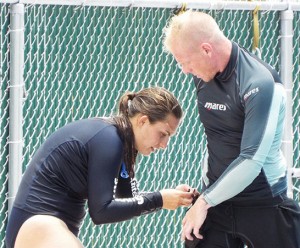I never truly grasped how difficult swimming through five hundred meters underwater is with a missing a leg until that moment. From my peripheral view of my mask, I could see the stream of bubbles coming from my Veteran’s regulator as if he were a steam engine chugging away at full speed with a missing wheel. We weren’t going to make it.
My eyes focused on my timer strapped beside my compass. Five minutes left. I could feel the acid building up in my thighs as they strained to keep finning. I only imagined how hard it was for him. The same mantra kept churning in my head as we pushed forward: Oh please, oh please, oh please, let us get to shore, so we don’t have to swim any more. Oh please, oh please, oh please…
A sharp tug from my buddy line swung my arms out of place throwing my compass bearing off. I looked back. His eyes were the size of saucers. Fumbling with his pressure gauge, he brought it to my eye level. My insides squirmed. His tank had less than 500psi of air left. Not good. Craning my neck to the left I peered at my air level. I had 2000psi. Instructors train you to give up your air when your buddy is in need. They never tell you how scary it is, though, to hand over your own regulator as I did for him. Exhibiting no hesitation, he plucked the air hose into his mouth. Turning my chin down, I began breathing off my secondary regulator. We weren’t in mortal danger — the surface was eleven feet above us — but it was a big deal for him so I gave him the OK signal with my hand. He returned it. In that micro-moment, I knew we were going to be OK. We would make it.
As I settled in for the long drive home from the Keys, I couldn’t stop mulling about the week I spent with the Combat Wounded Veterans Challenge group. My dive buddy had sustained a spinal injury from an IED blowing up under him when he was a Marine in Afghanistan. Due to complications with his spinal cord, he chose to remove his left leg. When we surfaced on the shore, his first word was “Damn” and his second was “Thank you.” He told me that he was on the verge of a panic attack as we swam, but the minute we started sharing air he realized that he had to calm down in order to finish. It reminded him of the camaraderie he felt when he was active duty. I leaned my head against the window and thought of that OK signal. I smiled. The one thing that I learned from that OK, is that some hurdles require you to finish as a team.
 I would like to attend this year’s summer trip because I know how to work with others in a team. I’ve personally experienced the thrills and challenges that scuba diving has to offer and know I could make a great addition to any activity. Whether that’s hanging coral “ornaments” on a PVC Christmas tree underwater volunteering beside a wounded Veteran or just unloading tanks after a long day, I’ll be willing to step forward and be a team member. Considering I have been in the SCUBANauts organization for six years, and many years before it living vicariously through my older sister, I know how SCUBANaut trips operate. One has to be flexible, meticulous, cooperative, and positive to squeeze the most out of the trip’s joys. Unfortunately, this summer will be my last chance to dive with SCUBANauts as a Naut. I will turn nineteen in September. I’m hoping that by attending this trip, I can create even more lasting memories than previous summers. I’m also hoping to reconvene with the Combat Wounded Vets to further my relationship with them. Those guys are true inspirations and they help me become a better diver. It will also be the fourth year I’ve worked with them and undoubtedly my last. In essence, this trip will be bittersweet if I attend because it’s my last chance to say goodbye and thank you. Thank you to SCUBANauts and thank you to the Combat Wounded Vets.
I would like to attend this year’s summer trip because I know how to work with others in a team. I’ve personally experienced the thrills and challenges that scuba diving has to offer and know I could make a great addition to any activity. Whether that’s hanging coral “ornaments” on a PVC Christmas tree underwater volunteering beside a wounded Veteran or just unloading tanks after a long day, I’ll be willing to step forward and be a team member. Considering I have been in the SCUBANauts organization for six years, and many years before it living vicariously through my older sister, I know how SCUBANaut trips operate. One has to be flexible, meticulous, cooperative, and positive to squeeze the most out of the trip’s joys. Unfortunately, this summer will be my last chance to dive with SCUBANauts as a Naut. I will turn nineteen in September. I’m hoping that by attending this trip, I can create even more lasting memories than previous summers. I’m also hoping to reconvene with the Combat Wounded Vets to further my relationship with them. Those guys are true inspirations and they help me become a better diver. It will also be the fourth year I’ve worked with them and undoubtedly my last. In essence, this trip will be bittersweet if I attend because it’s my last chance to say goodbye and thank you. Thank you to SCUBANauts and thank you to the Combat Wounded Vets.



Recent Comments